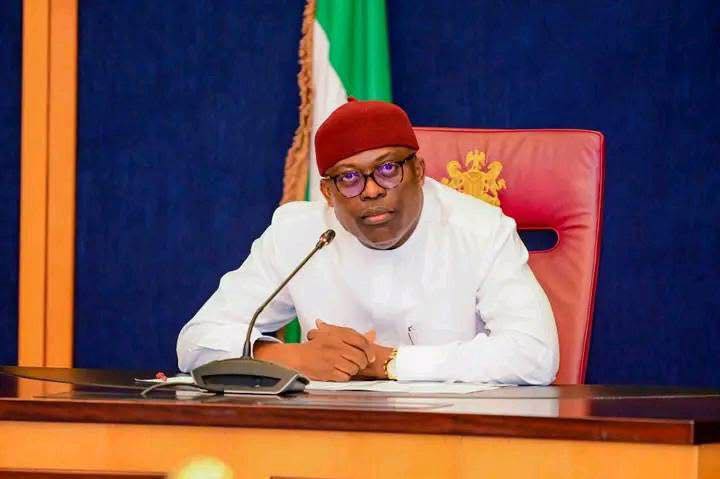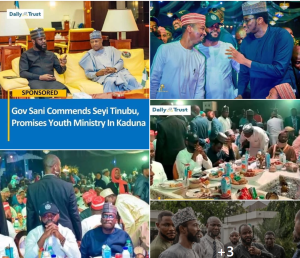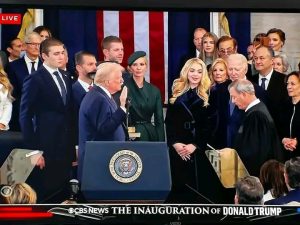Rivers State House of Assembly Led by Wike’s Ally, Speaker Martin Amaewhule, Adjourns Sine Die
On a day marked by significant political maneuvering, the Rivers State House of Assembly, under the leadership of Speaker Martin Amaewhule, adjourned sine die, a term signifying that the legislative body would cease its proceedings indefinitely without a set date for resumption. This decision came amidst growing tensions within the political landscape of the state, particularly following Governor Siminalayi Fubara’s earlier correspondence with the Assembly regarding his intention to present the state budget.
This adjournment raises several questions about the current state of governance in Rivers State, the relationship between the Governor and the House of Assembly, and the broader implications for the state’s political future. Let’s explore the various facets of this development, its causes, and its potential impacts on the political equilibrium in Rivers State.
At the heart of this political development lies the term “adjourn sine die.” In legislative parlance, this refers to an indefinite suspension of proceedings, essentially putting a halt to the Assembly’s activities without a set date to resume. In simpler terms, it means the legislative body has concluded its session for an unspecified period, which can be seen as a drastic and unusual move.
In the case of the Rivers State House of Assembly, the decision to adjourn sine die was taken despite the fact that Governor Fubara had sent a formal letter requesting to address the Assembly on Wednesday, with the intention of presenting his administration’s budget. The budget presentation is a significant event in any government, as it outlines the financial roadmap for the year ahead, detailing revenue and expenditure projections that affect every aspect of governance, from infrastructure projects to social services.
The adjournment, therefore, raises suspicions about the underlying reasons for the postponement, given the importance of the Governor’s address and the potential ramifications of delaying such a crucial event.
To understand the implications of this adjournment, it is essential to consider the political dynamics within Rivers State. The state has long been a political battleground, with the Peoples Democratic Party (PDP) firmly in control for several years. However, the dynamics have shifted significantly following the exit of former Governor Nyesom Wike, a dominant figure in the state’s politics. Wike’s tenure as Governor was marked by bold and often controversial decisions, and he remained a powerful force even after leaving office.
Martin Amaewhule, the current Speaker of the Rivers State House of Assembly, is widely seen as an ally of Wike. The Speaker has been instrumental in consolidating Wike’s legacy within the Assembly, ensuring that many of the former Governor’s policies and initiatives were supported and passed by the legislature. This close relationship between Amaewhule and Wike has been a defining feature of the political landscape in the state.
Governor Siminalayi Fubara, who succeeded Wike, is a relative newcomer to the political scene. While he is a member of the same political party (PDP), Fubara’s relationship with Wike and his allies in the Assembly has been somewhat complicated. Fubara is expected to continue Wike’s policies and maintain the PDP’s dominance in the state, but he faces the challenge of managing a divided political environment where loyalty to Wike still looms large.
The Rivers State House of Assembly is a key player in the state’s governance, as it is responsible for enacting laws, approving budgets, and providing oversight to the executive. The relationship between the Governor and the Assembly is crucial for smooth governance. In theory, the Assembly is supposed to work in tandem with the executive branch, but in practice, the dynamics can be far more complex.
The decision to adjourn sine die raises questions about the current state of that relationship. Governor Fubara’s intention to present the budget to the Assembly was an opportunity for him to lay out his vision for the state, including proposed allocations for various sectors such as education, health, infrastructure, and security. The budget presentation is also a critical moment for the Governor to garner legislative support for his administration’s priorities.
However, the adjournment throws a wrench in these plans. By preventing the Governor from addressing the Assembly at the scheduled time, it appears that the Speaker and his allies in the Assembly are sending a message to Fubara. This could be seen as an assertion of control by the Assembly, signaling that the Governor’s agenda is not necessarily guaranteed to receive the full backing of the legislature.
For Governor Fubara, the adjournment presents a significant challenge. His ability to govern effectively depends in part on maintaining good relations with the Assembly, as the legislature plays a key role in approving executive proposals, including the budget. If the Assembly is unwilling to cooperate or delays critical business, it can create a significant bottleneck in the Governor’s ability to implement his policies.
The adjournment also raises questions about the level of support that Fubara can expect from the legislature. Is this simply a temporary setback, or does it signal a deeper rift between the Governor and the Assembly? The fact that the adjournment occurred despite the Governor’s formal request to address the Assembly suggests that there may be some resistance within the legislature to Fubara’s leadership.
Additionally, the timing of the adjournment is crucial. By putting off the budget presentation indefinitely, the Assembly has created uncertainty about when—or even if—the Governor will be able to deliver his financial plan for the state. This delay could have ripple effects on the state’s development programs, as funds for key projects might not be allocated in a timely manner.
The decision to adjourn sine die also cannot be divorced from the ongoing influence of former Governor Wike. Although Wike is no longer in office, his political weight continues to be felt in Rivers State. As an ally of Speaker Amaewhule, Wike’s presence looms large over the Assembly’s actions. It is widely believed that Amaewhule, as Speaker, would not have taken such a drastic step without consulting or receiving backing from Wike or other key figures within their political camp.
This creates an intriguing situation for Fubara, who must navigate the complex legacy of his predecessor. While Fubara is tasked with leading the state, his ability to assert his authority is constantly being tested by those who remain loyal to Wike. The adjournment could be seen as part of a larger political game in which the Assembly, under the influence of Wike’s allies, seeks to maintain its power and independence from the executive branch.
The tension between the legislative and executive branches is not new to Nigerian politics, but it takes on added significance in Rivers State, where personal loyalties and political alliances can often overshadow policy debates. If Fubara is unable to find common ground with the Assembly or to convince key lawmakers to support his initiatives, his ability to lead effectively will be severely hindered.
As expected, the decision to adjourn sine die has attracted significant attention from the media and the public. Critics of the Assembly’s actions argue that the adjournment is politically motivated and designed to undermine the Governor’s authority. By denying the Governor the opportunity to present his budget, the Assembly is seen by some as engaging in partisan politics at the expense of the state’s development.
On the other hand, supporters of the Assembly, particularly those aligned with Wike’s faction, may view the adjournment as a necessary check on the power of the executive. They may argue that the Governor should not be allowed to push through his agenda without adequate scrutiny and oversight from the legislature. This divide in public opinion reflects the broader political polarization in the state, where personal and factional loyalties often take precedence over the collective good.
The media plays a key role in shaping public perception of the situation. How the media covers the adjournment and the reasons behind it will influence how the public perceives the actions of both the Assembly and the Governor. The narrative that emerges in the coming days and weeks will have a significant impact on the political fortunes of the key players involved.
The adjournment sine die of the Rivers State House of Assembly is a reminder of the complex and often unpredictable nature of Nigerian politics. With the Governor’s budget presentation delayed indefinitely, questions about the state’s governance and political stability will likely dominate public discourse in the coming weeks.
For Governor Fubara, this setback is a test of his leadership. If he can navigate the current political tensions and find a way to regain the cooperation of the Assembly, he may yet be able to fulfill his mandate and secure the necessary support to drive his administration’s agenda forward. However, if the rift between the executive and legislative branches deepens, it could create a prolonged period of instability that hampers the state’s progress.
As for Speaker Martin Amaewhule and the Assembly, the adjournment may be seen as a temporary victory, but it also carries risks. By delaying the Governor’s budget presentation, the Assembly runs the risk of alienating the public and portraying itself as an obstructionist body. The challenge for Amaewhule and his allies will be to balance their political objectives with the need to serve the interests of Rivers State as a whole.
In the coming months, all eyes will be on Rivers State as political developments unfold. Whether this adjournment is a temporary political maneuver or the beginning of a more significant political crisis remains to be seen. One thing is certain: the political dynamics of Rivers State are anything but predictable.





